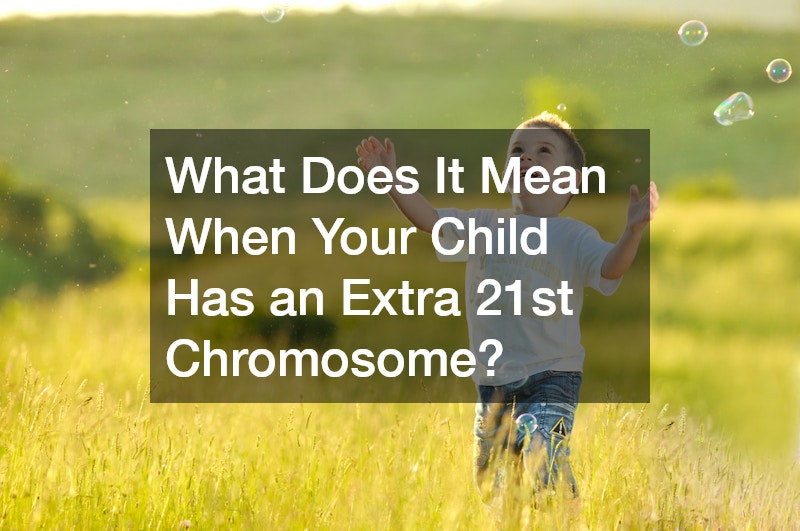Understanding what it means when your child has an extra 21st chromosome is crucial for parents and caregivers. This condition, commonly known as Down syndrome, affects numerous children worldwide. This article will explore the key aspects, ranging from medical definitions to day-to-day parenting tips, providing a comprehensive overview of the condition.
What is Down Syndrome?
Down syndrome is a genetic disorder caused by the presence of an extra copy of chromosome 21. This additional genetic material alters the course of development and causes the characteristics associated with the condition.
Down syndrome is the most common chromosomal condition diagnosed in the United States, with about 6,000 babies born each year affected by it. Children with Down syndrome often have facial features that are generally distinctive and other have developmental delays, although the degree can vary widely. Despite the challenges, individuals with Down syndrome can lead fulfilling and productive lives with the right support and opportunities.
There are three types of Down syndrome: Trisomy 21 (nondisjunction), Translocation, and Mosaicism. Trisomy 21 accounts for approximately 95% of Down syndrome cases and occurs when there are three copies of chromosome 21 in all cells. Translocation, seen in about 4% of cases, occurs when a part of chromosome 21 attaches to another chromosome. Mosaicism, the least common type, is when there is a mix of cells, some having the usual 46 chromosomes and others having 47. The type of Down syndrome can affect both the severity and presentation of symptoms, influencing both developmental and medical outcomes.
The diagnosis of Down syndrome is typically confirmed through karyotype testing, a laboratory procedure that examines the chromosomes in a sample of cells. This test is usually performed shortly after birth or can be detected prenatally through screenings such as the nuchal translucency test during the first trimester. Genetic counseling is often recommended for families expecting a child with Down syndrome to help them understand the condition and prepare for necessary medical and developmental support. The journey for each family will be different, but early detection and intervention can significantly enhance the quality of life and potential for each child with Down syndrome.
How Does Down Syndrome Affect Development?
Developmental milestones for children with Down syndrome may be delayed compared to their peers, but it is important to recognize that each child is unique in their progress. Milestones such as sitting, walking, and talking will likely occur later, but with patience and the right therapies, significant strides can be made. Early intervention services can significantly help improve a child’s physical and cognitive abilities. These services can include physical therapy, speech therapy, and occupational therapy, which are essential in addressing the specific developmental needs of children with Down syndrome. Proper support and encouragement can facilitate the development of skills necessary for improved independence and quality of life.
In addition to developmental delays, children with Down syndrome often face challenges in learning and academic performance. Many children will attend mainstream schools, either fully integrated or with the support of special education services. Individualized Education Programs (IEP) are tailored to each child’s specific needs and help to set achievable goals in the educational setting. Teachers and specialists trained in working with children with Down syndrome can provide the appropriate teaching strategies that support these students in achieving their personal best. Encouragement, patience, and a supportive educational environment play pivotal roles in helping children with Down syndrome reach their potential.
Social development is another crucial area where children with Down syndrome may need additional assistance. Teaching social skills and creating opportunities for interaction with peers can enhance their social competence and boost self-esteem. Participation in group activities, whether in educational settings, community programs, or family events, plays a significant role in socializing and integrating children with Down syndrome. With guidance and encouragement, many children succeed in forming meaningful friendships, enhancing their quality of life. Fostering an inclusive and accepting community is critical to allowing children with Down syndrome to thrive socially and emotionally.
What Medical Conditions are Associated with Down Syndrome?

Individuals with Down syndrome are at an increased risk for a variety of medical conditions, necessitating regular medical care and monitoring. Congenital heart defects are prevalent, with nearly half of all children born with Down syndrome having some form of heart condition, necessitating early detection and sometimes surgical interventions. Regular check-ups with a cardiologist are often required to manage heart-related health issues. Additionally, respiratory infections, hearing loss, and vision problems are more common in children with Down syndrome. Addressing these health challenges early and effectively can enhance the quality of life and overall well-being for individuals with Down syndrome.
Thyroid disorders, such as hypothyroidism, are also more common among individuals with Down syndrome and require ongoing monitoring and treatment. Early detection is vital in managing these conditions to support proper growth and development. Furthermore, gastrointestinal issues are more frequently encountered, ranging from mild to severe, and may include conditions like celiac disease or poor muscle tone affecting digestion. Regular consultations with healthcare providers and specialists ensure that these medical conditions are identified and managed appropriately to minimize complications and improve health outcomes.
Children with Down syndrome also face a higher risk of developing certain autoimmune disorders, such as type 1 diabetes and certain types of leukemia, compared to their peers. Awareness and vigilant monitoring by both parents and healthcare providers can lead to earlier diagnosis and more effective interventions. Regular blood tests and other medical evaluations are crucial in keeping any developing health issues in check. The comprehensive care of individuals with Down syndrome requires a team approach involving pediatricians, cardiologists, endocrinologists, and other specialists as needed. Consistent medical attention and preventive care are essential in helping individuals with Down syndrome maintain a healthy and active life.
How Can Parents and Caregivers Support a Child with Down Syndrome?
Supporting a child with Down syndrome involves fostering an environment that encourages growth, learning, and happiness. Parents and caregivers can play a substantial role in stimulating development through daily activities that encourage exploration and interaction. Encouraging communication, even at an early age, supports speech and language development. Engaging in reading, singing, and conversations not only bolsters cognitive skills but also strengthens the emotional bond between parent and child. A nurturing environment extends beyond the home, and involving the child in community activities can provide broader opportunities for development and socialization.
Advocating for the child’s educational needs is another critical aspect where parents and caregivers are essential. Collaborating with educators and participating in setting goals in Individualized Education Plans (IEP) ensures that the child receives the appropriate support in academics. By actively participating in the educational process, parents and caregivers can help tailor learning experiences that resonate with the child’s unique strengths and abilities. Special education services and resources are crucial in this aspect, and parents should make the most of these available supports. Furthermore, involvement in support groups can provide valuable insight, shared experiences, and emotional assistance to better navigate the challenges and triumphs that come with raising a child with Down syndrome.
Emotional support is as important as physical and educational needs for children with Down syndrome. Encouraging self-esteem and independence through positive reinforcement and celebrating small victories can significantly impact a child’s self-worth and motivation. Parents and caregivers should guide children in developing skills necessary for daily living and promote inclusion by engaging in family activities and allowing the child to participate in decisions when appropriate. Strengthening familial bonds and creating a supportive home environment empowers children with Down syndrome to face the world with confidence. The journey might be challenging, but love, patience, and understanding form the bedrock of a fulfilled and joyful life for both the child and their family.
What Are the Myths and Misconceptions About Down Syndrome?
Several myths and misconceptions about Down syndrome prevail, often contributing to stereotyping and misunderstanding. One common myth is that individuals with Down syndrome are always happy and affectionate, which simplifies and misinterprets a broad range of emotions and intelligence they possess. People with Down syndrome experience the full spectrum of emotions and should be recognized as individuals with unique personalities and abilities. Overcoming such myths requires education and awareness, which fosters a more accurate understanding and acceptance. Dispelling myths is fundamental in promoting a respectful, inclusive, and informed society.
Another misconception is that the life expectancy for individuals with Down syndrome is significantly lower than the general population. Advances in medical care and improved living conditions have significantly increased life expectancy over the years. With proper healthcare, individuals with Down syndrome often live well into their 60s and beyond. Furthermore, the belief that individuals with Down syndrome cannot lead independent lives or contribute meaningfully to society is outdated. Many people with Down syndrome work, live independently or semi-independently with minimal support, and engage in relationships and community activities, showcasing their capabilities and potential when given the opportunity.
It is also commonly misunderstood that all individuals with Down syndrome will experience severe intellectual disabilities. However, the level of intellectual disability varies among individuals, and while some might face moderate challenges, others perform on par with typical peers in various fields. Education, early intervention, and continuous support play crucial roles in facilitating the intellectual and emotional development of individuals with Down syndrome. By addressing these misconceptions and highlighting the real abilities and achievements of individuals with Down syndrome, society can move towards greater inclusivity and respect for diversity.
The journey of raising a child with an extra 21st chromosome is uniquely challenging and rewarding. Understanding the medical, developmental, and social aspects of Down syndrome is key to providing the best support and care. Through dispelling myths and embracing comprehensive educational, medical, and emotional support strategies, families can better navigate the complexities and joys of life with Down syndrome. Early interventions, supportive communities, and well-informed parents and caregivers make a profound difference in the lives of individuals with Down syndrome. As advocates and allies, we can contribute to creating a world where everyone knows and celebrates the diverse talents and contributions of individuals with Down syndrome.

